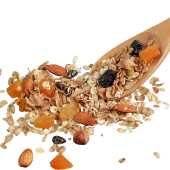
Read about the importance of Viscous Fiber for weight loss and boost your health. Fiber is an essential component of a healthy diet that helps to maintain digestive health, reduce the risk of chronic disease, and promote weight loss.
However, not all types of fiber are created equal, and some have a more significant impact on metabolism and appetite than others. Viscous fiber has been shown to have a positive effect on weight loss.
So What is Viscous Fiber?
Viscous fiber is found in plant-based foods like beans, asparagus, and oats. Viscous fiber, a specific type of soluble fiber, has been shown to be particularly effective in promoting weight loss. Viscous fiber forms a gel-like substance when it comes into contact with water. Find out the importance of hydration for weight loss here.
This gel slows down the digestive process, making you feel fuller for longer and reducing your appetite.As a result, incorporating more viscous fiber into your diet can help to reduce calorie intake and promote weight loss.
In this article, we will explore the benefits of viscous fiber, how it works, and how you can incorporate more of it into your diet to achieve effective and sustainable weight loss.
Watch how Viscous Fiber helps weight loss here:
Types of Fiber
Fiber is classified into two categories, soluble and insoluble.
Soluble fiber: dissolves in water and forms a gel-like substance in the digestive tract.
Insoluble fiber: does not dissolve and passes through the digestive system largely intact.
Both types of fiber have health benefits, but the focus of this article is on the specific type of soluble fiber that has been found to be most effective for weight loss: viscous fiber. Viscous fiber is a type of soluble fiber that is shown to reduce appetite, as it forms a thick, gel-like substance in the digestive tract that slows down the movement of food through the digestive system, leading to a feeling of fullness.
Sources of Viscous Fiber for Weight Loss
The main sources of viscous fiber are plant foods such as:
- Beans
- Asparagus
- Brussel Sprouts
- Oats
- Oranges
- Flax Seeds

Rich sources of viscous fiber are found in a variety of legumes, such as beans, lentils, and peas. For instance, one cup of cooked black beans contains 4 grams of soluble fiber, while one cup of cooked lentils provides 5 grams.
Other good sources of viscous fiber include vegetables like asparagus, Brussels sprouts, and sweet potatoes, as well as whole grains like oats and barley. Fruits like apples, oranges, and berries also contain pectin, a type of viscous fiber that can help promote satiety and reduce calorie intake.
It’s worth noting that not all plant-based foods are rich in viscous fiber. Therefore, it’s important to choose foods that contain significant amounts of this type of fiber to reap the health benefits.
Try adding a portion of these foods to your main meals. It’s recommended to gradually increase fiber intake to avoid digestive discomfort and to drink plenty of water to help fiber move through the digestive system smoothly, so start one meal at a time and build up your tolerance of viscous fiber for weight loss.
What about Viscous Fiber Supplements for Weight Loss?
Fiber supplements are usually ineffective for weight loss. But some viscous fiber supplements such as glucomannan can aid in weight loss.
Glucomannan Konjac Powder
It is important to note that incorporating more whole foods rich in viscous fiber into your diet is the best way to achieve long-term weight loss results.
Benefits of Viscous Fiber
Consuming foods high in soluble fiber has been linked to a variety of health benefits, including improved gut health and reduced inflammation.
Viscous fiber is particularly effective in promoting weight loss.
When consumed, viscous fiber forms a gel-like substance in the gut that slows down the digestive process, leading to increased feelings of fullness and reduced appetite and ultimately resulting in weight loss.
In addition to viscous fiber for weight loss benefits, viscous fiber has also been shown to improve blood sugar control, lower cholesterol levels, and reduce the risk of heart disease. This is thought to be because viscous fiber slows down the absorption of carbohydrates, leading to a more gradual rise in blood sugar levels.
Additionally, viscous fiber can bind to cholesterol in the gut and prevent it from being absorbed into the bloodstream.
Check out this webpage for more Fiber benefits!
Conclusion and final thoughts 💭
Overall, incorporating more viscous fiber-rich foods into your diet can have numerous health benefits and may be an effective strategy for promoting weight loss and improving overall health.
So is viscous fiber your new secret weapon for weight loss?





Leave a Reply